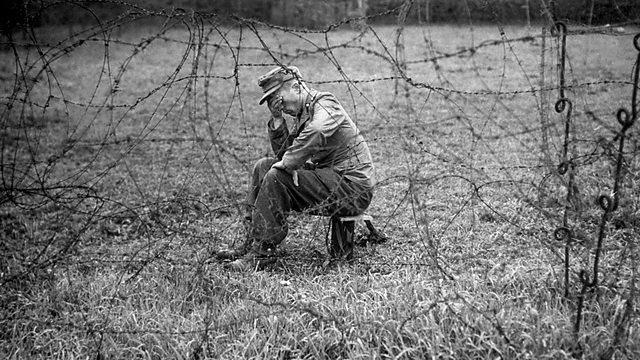“Enjoy the war, for the peace will be savage,” was apparently a macabre joke circulating in the German military towards the end of World War Two. Peter Molloy’s searing documentary, 1945: The Savage Peace, showed us just how prescient it would prove, charting the cruelties that would follow the end of conflict. Man’s inhumanity to man would continue long after the war itself had formally ended.
It showed itself in many different forms of vengeance and reprisal. Soviet troops advancing on Berlin raped German women of all ages on an almost unimaginable scale, not something that’s mentioned in histories of the Red Army, nor a memory to be associated with the grandeur and pathos of Moscow’s Victory Day commemorations. “It was over quickly, thank God,” we heard Christa Ronke, a Berlin girl who kept a diary through 1945, remembering how she was raped. Except it wasn’t, of course: these were violations repeated almost ad infinitum, gang rapes carried on around the clock, with the full knowledge of the army commanders. In a ghastly overlapping of imagery, the troops who had defended their own occupied Motherland at such a heavy price wreaked their unsated lust for revenge on the female population of their erstwhile occupiers.
It can only be salutary to be reminded of that dark side of peace
Elsewhere the reprisals were of different sorts, often directed at people for no other reason than that they were German by nationality. Czechoslovakia was a case in point, and Savage Peace opened with scenes of execution in Prague, taken by a photographer, the father of one of Molloy’s interviewees, who had been specially brought along to record it: no compunction here about repeating the crimes of their previous oppressors, and no sense of restoring order – “just reprisal” was a concept allowed there until as late as the end of October 1945. The script described the process as anarchic, vengeful and bloody, and you suspect the element of anarchy was as strong as anything else: children as young as six were sent to tribunals, and hanged, even though they could barely reach the gallows.
The wider story was the expulsion of millions of ethnic Germans from their homes, a process described by George Orwell as an “enormous crime”. The rhetoric of the Potsdam conference about post-war “orderly and humane population transfers” could hardly have been further from reality, with human hostility only part of a wider chaos compounded both by the breakdown of infrastructure and an almost total lack of medical care. “I had to end my childhood very early,” was the laconic verdict of one woman, a child refugee who ended up living wild in the forests of Lithuania. If anything, the remarkable thing seemed that any of those whose memories we heard here had managed to create anything like a normal life afterwards. The details were so telling, like how at gatherings of those who had been expelled from East Prussia, the memories of their homeland – of storks and elks – were so particular.
The ironies of history were as dark as they come. The same train cars that had brought the victims of Nazism to the concentration camps were used to move ethnic Germans back to what was left of their homeland, journeys lasting weeks that saw many dying along the way. Zgoda, previously a satellite camp of Auschwitz, saw a Jewish commander who'd fought with the partisans lording it over new inmates, forcing them to sing the anthems of the Third Reich.
As we mark the end of war in 1945, it can only be salutary to be reminded of that dark side of peace, of the fact that the moral compass of the victors so often proved skewed. Savage Peace was a film of bruising archive material, and the very painful memories of the dozen or so men and women – women, predominantly – whose testimonies we heard. Michael Pennington’s narration, lapidary, restrained, but speaking volumes, was exactly right for this story of the largest ethnic cleansing in history: "an atrocity hidden in plain sight".















Add comment